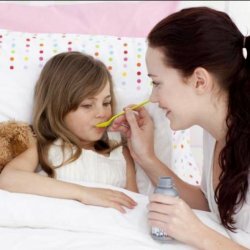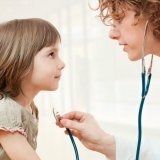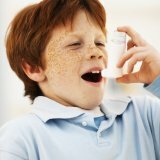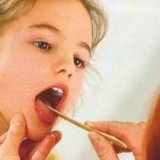Cough with child's temperature
 Every parent knows that children often get sick. Kids can pick up ARVI or ARI, ENT diseases, bronchitis and the like. Many childhood ailments are accompanied by fever. That is why it is very important immediately to pay attention to the symptomatology, because the elevated temperature of the body signals an inflammatory process. In such cases, urgent treatment should begin.
Every parent knows that children often get sick. Kids can pick up ARVI or ARI, ENT diseases, bronchitis and the like. Many childhood ailments are accompanied by fever. That is why it is very important immediately to pay attention to the symptomatology, because the elevated temperature of the body signals an inflammatory process. In such cases, urgent treatment should begin.
Causes of cough in a child with fever
Cough may appear not only in ARVI or ARI diseases. It also occurs with influenza, pharyngitis, laryngitis, tonsillitis, tracheitis, rhinopharyngitis, pneumonia, diphtheria, measles, whooping cough, and pleurisy.
The flu is manifested by general malaise and symptoms of intoxication( pain in the body, headache and the like).However, the temperature rises very rapidly to 39-40 degrees and a cough appears. When ARVI also appears temperature, but not high, and also cough and runny nose. Sometimes there is conjunctivitis. It is worth noting the fact that the fever can last about a week and be accompanied by diarrhea.
If the baby coughs, but complains of pain when swallowing and choking in the throat, then it can be a viral inflammation of the mucous throat - pharyngitis. At the same time, the temperature rises slightly - up to 37-37.5 degrees. If the mucous pharynx and nose are simultaneously affected, then this indicates a rhinopharyngitis. With this ailment, the baby will have dryness and sore throat, dry cough, nausea and vomiting, shortness of breath and fever.
With laryngitis, the voice becomes hoarse, and in the throat there is a perspiration. The baby will suffer from a dry cough and a slight fever. Angina or tonsillitis are complex diseases that can give different complications to the entire body. These two diseases can appear against the background of enteritis or mononucleosis. In such cases, the child will have cough, diarrhea and high body temperature.
If the mucous respiratory membrane( tracheitis) becomes inflamed, the child has a dry cough and a fever. Usually during the night and morning time of the cough intensifies and sometimes there is pain behind the breastbone. The temperature will be low.
Bronchitis begins with a dry cough and a temperature of 37. Gradually, the cough becomes stronger, with the spitting of phlegm. Unfortunately, bronchitis is dangerous because it can give serious complications and lead even to pneumonia. If the cough does not pass for a long time, and the temperature rises, then you should immediately consult a doctor.
Pneumonia is accompanied by a strong cough and high fever. It can be caused by viruses of parainfluenza, staphylococcus and other viruses or bacteria. This is a dangerous disease that can lead to death. Therefore, you should immediately consult a doctor.
With a pleurisy, the baby has a wet cough and a fever. If the cough is dry, then this indicates fibrous pleurisy. In many cases, these pathologies are complications after pneumonia.
Cough with fever in a child can be caused by whooping cough. At the initial stage of the disease, the temperature is not too high. Often, the symptomatology is similar to the symptoms of ARI.Therefore, parents do not pay much attention. Only after 8-10 days there are severe attacks of coughing. At the same time cough moist and sputum is difficult to remove. Unfortunately, against this cough, almost nothing helps. It can last up to a hundred days. In such cases, doctors send the baby to the test. The child must donate blood, hand over sputum smears. The easiest complication of whooping cough is bronchopneumonia, in which there is a cough with shortness of breath and the temperature rises to 38 degrees. The most dangerous complication is stopping breathing.
This diagnosis, like diphtheria, is made if the child has a larynx with this virus to form films that are soldered to the tissues. In this case, the child will be tormented by attacks of barking cough with temperature, swelling of the mucous membranes and lymph nodes. This can lead to serious consequences.
Elevated temperature, cough and rash on the body indicate measles. With this disease, the temperature rises to 39 degrees. Cough becomes dry and barking. The rash first appears on the neck and face, and then spreads throughout the body. The disease is contagious.
Cough cure with
temperature Cough with temperature should never be left untreated. First of all, it is necessary to take the baby to the therapist, so that he sets the correct diagnosis. Only after this, the doctor will be able to prescribe the appropriate treatment taking into account the individual characteristics of the baby's body. In no case should you do self-medication, since you can hurt the baby.
At high temperature( above 38 degrees), doctors prescribe such antipyretic agents for children: Panadol Baby, Ibufen Junior or Ibufen D. These drugs are among the safest for babies. You can also give Fervex for children or other drugs in the form of a suspension or syrup.
When a cough with high temperature, the baby is prescribed antibiotics. In such cases, pediatricians are credited with: Amoxylate, Amoxicillin, Flemoxin, Clarithromycin, Fromilide, Clacid, Clicimine, Azithromycin, Sumamed, Azitral, Ospamox and others. The dosage of each drug is given individually. It is calculated based on the body weight and age of the baby. With whooping cough, antibiotics should be taken no more than three weeks. Further antibacterial therapy does not give positive results.
Cough treatment with temperature should be comprehensive. Therefore, it is important to find the right remedies that can help cough. If the cough is dry, then it must be made wet, so that the sputum easily leaves. Excellent help to dilute sputum different syrups. For example, syrup Ambroxol, Lazolvan, Ambrobene. These drugs can be given to children up to two years. With laryngitis, pneumonia, tracheitis and other diseases, children over 12 years of age are prescribed Ats, Acetastad or Acetylcysteine.
Very good expectorants are :
- Syrup Althea - you can give children under 12 years of one teaspoon.50 ml of syrup should be diluted with warm water. Take up to 5 times a day. Children over 12 years should take a tablespoon up to 5 times a day after meals.
- Petrussin - take a teaspoon three times a day.
- Bronchicum - children under two years of age should be given ½ teaspoon twice a day. Children from two to six years should be given one teaspoon three times a day. After 12 years, it is allowed to give one dessert spoon three times a day.
- Broncholitin for children from three to ten years should be given 5 mm 3 times a day, over 10 years - 10 ml to four times a day after meals.
- Bronchitis - can give babies from three months to 10 drops three times a day after feeding. From the age of one should add to 10 drops one drop for each year of life of the crumbs.
- Mucaltin is an excellent expectorant. It is made on the basis of the root of the altea. Children from three to five years should be given half the tablet three times a day. You can dissolve the tablet in water. After five years it is necessary to give a whole tablet.
- Sinecode Syrup can be given only as prescribed by the doctor, since the drug is strong enough. It is prescribed only with a strong cough, which is accompanied by high fever and vomiting. Children from three to six years should take 5 ml of syrup three times a day. Children from six to twelve years old - 10 ml each, after 12 years - 15 ml each.



